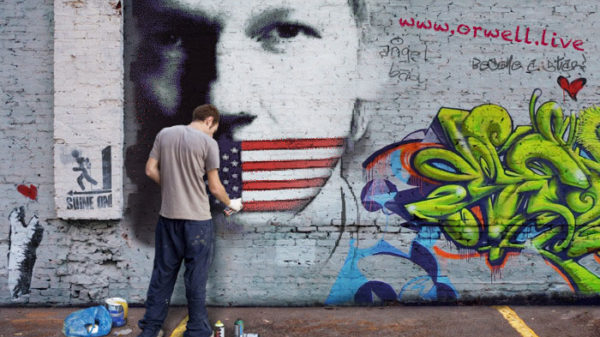it’s pretty hot at Camp Arifjan, in Kuwait, in the military base where Bradley Manning is addressed after the arrest caused by the betrayal of his friend Adrian Lamo.
After having rummaged through thousands of files documenting the abuses for a long time, the former intelligence analyst tastes the Guantanamo treatment methods applied by the US military to war prisoners.
The cell provided is small: a narrow space of two and a half meters for two and a half meters. 1
Just to provide a comparison with another well-known cubbyhole, the “people’s prison”, improvised by the Brigate Rosse to keep Aldo Moro segregated, was less than a meter wide and four meters long.
As written on L’Espresso 2, Manning is imprisoned in this niche “for twenty-three hours a day, for fifty-nine days” (arrested at the of May 2010) with the only company of the bars on the window, a toilet and a shelf to store… nothing. No visits granted (not even relatives), television is forbidden and newspaper are denied.
“I thought I would have died in that cage – he will later declare to a judge of the Martial Court – because I considered it a cage for animals”.
During the “stay” in Kuwait, Manning is charged with the accuses related to his detention: having “transferred classified information on his personal computer and installed unauthorized software on a computer part of a classified system, in relation to the leak about a video on a helicopter attack in Iraq carried in 2007.
Furthermore, “having communicated, transmitted and delivered Defense pieces of information to an unauthorized source and revealed secret information relating to national defense, being aware that such information could have damaged the United States”. 3
The worst, however, is just over 10,000 kilometers away. The distance that separates “Bradass87” from his new destination in the United States. Manning had probably imagined the hell in his adolescent torments more comfortable than the privations he will undergo in the Quantico base, Virginia.
Without a trial or a conviction, Manning faces, for nine very long months, a shameful detention regime for a perfect democracy.
Isolated for twenty-three hours a day, he maintains a minimum of muscular responsiveness in the only window dedicated to physical exercises: an hour when it draws imaginary “8” in its cell of two by four metres.
It seems to be in front of a realistic representation of Vincent van Gogh’s Prisoners Exercising
The screams of the guards act as morning alarm and mark the time of the day from 5 a.m.. From this moment on, the prisoner Manning is no longer allowed to lie down. If he tries to, the guards immediately intervene to put him seated or stand up.
The protocol provides a suffocating vigilance. Every five minutes Manning is asked “if everything is all right”.
For the newcomer to Quantico, even the contact with sunlight follows the rhythm of minutes. A few, anyway. Moments that pass quickly. About twenty in all, chained and watched all the time.
An authentic torture.
Not even nightfall, the cloak behind which Manning shelters to face fear, may soften the revenge of the authority.
On the contrary a blanket hiding the face, or the orientation of the body facing the wall during the rest, are enough to authorize the intervention of the agents.
Manning, by regulation, sleeps (without a pillow or linen, often completely naked in order to “prevent extreme or self-injuring acts”) from 1 p.m. to 11 p.m., with his face turned to the lamp, obviously turned on.
“The funniest thing in my cell – he says – was the mirror. You can interact with yourself. I’ve spent a lot of time with him.”
However, something is moving. In support of the boy from Crescent, arrive unexpectedly the words of Fr. J. Crowley, spokesman for the State Department: “What Manning is suffering is absurd, counterproductive and stupid.” Statements that will lead to his resignation shortly after.
A gesture that forces Barack Obama on the defensive (“who, as a senator, played as paladin of whistleblowers, but, as president, has pursued them more than all the previous ones put together” 4).
“I asked the Pentagon – Obama says – if the procedures are appropriate. They answered yes. ”
An answer that, however, contrasts with the document about torture drafted by the UN special rapporteur Juan Mendez; a memory focused on the “cruel and inhuman” treatment given to Manning.5
At the end of August 2013, it comes the inescapable martial court sentence for Bradley Manning: 35 years of detention, as guilty of 20 of the 21 charges charged to him. Luckily for him the most serious one (which foresees the death penalty), the “connivance with the enemy”, is not attributed to him.
A few hours after the sentence, with an official note sent to the NBC “Today” program, Bradley Manning (who had already been diagnosed with the “gender dysphoria” in prison), began his personal struggle for sexual identity.
«I want to be subjected – it’s written in the note- to a hormonal therapy as soon as possible. I hope you will support my transition. I also ask to be called by my female name, Chelsea ». 6
Despite the many obstacles met, mainly due to the disturbing action of the Government and after two suicide attempts, Chelsea won his battle of dignity in 2016, supported by the lawyer Chase Strangio, from Aclu, one of the main American civilians rights organizations.
At the end of his second term, President Obama, with a gesture of clemency, reduces the penalty imposed to Manning to seven years (the release term was initially planned for 2045).
At the same time both Edward Snowden (with a call via twitter) 7 and Wikileaks by the voice of its founder, Julian Assange, moved to support the liberation of Chelsea.
On May 17, 2017, Chelsea Manning, after serving seven years in prison, leaves the Fort Leavenworth prison as a free woman. “For the first time, I see a future as Chelsea. I come to imagine myself surviving and living in the skin of the person I am in the world outside».
It looks like the end of a nightmare and the beginning of a new path. It will be so until March 8, 2019 …
(to be continued).
1 Fabio Chiusi, “Chelsea Manning ora è libera, ma la sua prigionia è stata un inferno”, L’Espresso
2 Fabio Chiusi, “Chelsea Manning ora è libera, ma la sua prigionia è stata un inferno”, L’Espresso
3 David Leigh, Luke Harding, “Wikileaks: Inside Julian Assange’s War on Secrecy, The Guardian
4 Fabio Chiusi, “Chelsea Manning ora è libera, ma la sua prigionia è stata un inferno”, L’Espresso
5 Ed Pilkington, “Bradley Manning’s treatment was cruel and inhuman, UN torture chief rules”, The Guardian
6 Manning : «Sono donna, voglio essere chiamato Chelsea», Corriere della Sera
7 https://twitter.com/Snowden/status/819177951040249856





























